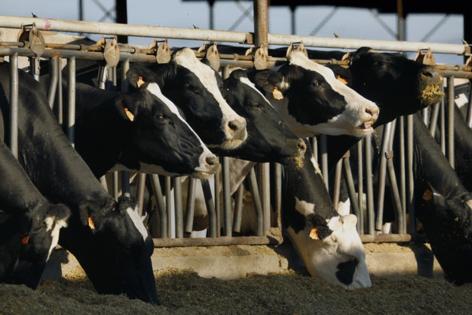Tad Weber: Trump's plan on import tariffs threatens California farmers with big losses
Published in Op Eds
Donald Trump won Fresno County for the first time ever in the November election, and in fact the Republican president-elect made it a clean sweep of all the counties of the San Joaquin Valley.
But now California’s farm country faces a “be careful what you wish for” moment.
That is because the tariffs that Trump has said he wants to impose on imports from China and other nations could spark a trade war, and that would mean potentially huge losses for farmers and dairy operators in the Valley.
According to new projections by researchers from UC Davis and North Dakota State University, Fresno, Tulare and Merced counties would be among the top five biggest losers in any tit-for-tat spurred by Trump’s tariffs.
“If the worst of the proposed tariffs go into effect, California could see a reduction of up to one-fourth of its agricultural export value, translating to a potential $6 billion in losses annually,” says the report by Colin A. Carter, Sandro Steinbach, and Yasin Yildirim. Their study is entitled “Further trade wars will harm California agriculture.”
The researchers broke down losses by county, and Fresno County comes out on top with a projected $983 million loss in export sales resulting from a trade war. Tulare County is ranked third, at $691 million in losses, while Merced County at $464 million is fourth. Kern County ranks second, at $842 million, and Imperial County is fifth at $213 million.
For context, Fresno County had $8.5 billion in gross revenues in 2023, the most recent year of the annual crop report.
Fresno County is one of the top farm-producing counties in the nation, thanks to dairy, almonds and pistachios. One of the key markets for locally grown nuts is China, and Trump has signaled he wants to apply a 60% tariff on all imports coming into America from China.
Making matters more dire, Trump has also said he wants to put a 10% tariff on all imports, not just those from China. He went further with Mexico and Canada, promoting a 25% tariff that would be imposed until borders with America are secured and the drug trade is stemmed.
China would retaliate with 60% tariffs of its own, the study says. That would make nuts grown by Valley farmers more expensive for Chinese consumers than those produced by growers in other nations. Dairy products would also be similarly impacted.
“Some of the most vulnerable commodities are pistachios, dairy, wine, and almonds, all of which heavily depend on China’s import demand,” the study says.
Trump tariff history
Is it a guarantee that China would retaliate with tariffs of its own? The researchers looked back several years to answer that question.
“When the U.S.-China trade conflict was initiated in 2018 during the (first) Trump administration, China retaliated with tariffs on U.S. agricultural goods, hitting California’s top farm exports hard,” they note. “Almond prices, for example, fell from $2.50 per pound before the trade war to just $1.40 per pound during the trade war.
“While Midwestern farmers received significant federal subsidies to cushion the trade war blow they experienced, for political reasons, California’s farmers were largely left out of the government compensation schemes.”
Trade war or targeted tariffs?
When the tariffs threat is coupled with Trump’s promise to deport undocumented people — most of California’s farm workers do not have legal status — it is interesting to see how farmers nationally back the president-elect.
An analysis by the nonprofit news outlet Investigate Midwest found that 78% of America’s most farm-dependent counties went for Trump in the election. There are 444 such counties in the United States; all but 11 chose Trump. Most of the counties are in the central region of the nation.
Back in the Valley, Tulare County dairy operator Tom Barcellos told The Guardian that he supports Trump because he tried to solve water issues in his first term. Barcellos also said California’s Democratic-led state government has created a thicket of environmental rules that make it hard to keep running.
Barcellos may see things differently if Trump’s tariffs shrink his dairy sales.
I advocated recently that Trump and Congress work together to create a legal status for farm and dairy workers. Without them, I asked, who will do the work that must be done to keep the food supply functioning?
In a similar way, Trump could target tariffs to certain imports, and not just use a blanket approach. That may keep California farm exports from being retaliated against.
Until the president-elect revises his plan, the blanket approach will be used come January. None other than Chinese President Xi Jinping thinks that is a bad idea.
“Tariff wars, trade wars and technology wars run counter to historical trends and economic laws, and there will be no winners,” Xi Jinping said in Beijing Tuesday when meeting with leaders of 10 major international organizations, including the World Bank, International Monetary Fund and World Trade Organization.
Here is hoping the Valley’s Republican congressional members — Vince Fong of Bakersfield and David Valadao of Hanford — can get Trump to see that tariffs are a bad idea.
_____
©2024 The Sacramento Bee. Visit sacbee.com. Distributed by Tribune Content Agency, LLC.




























































Comments